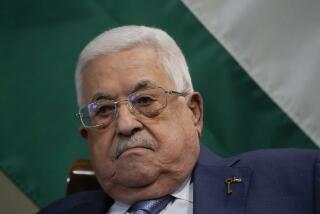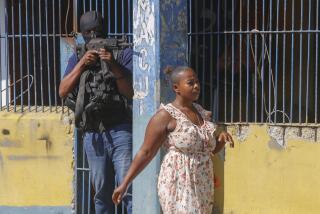Political Players to Figure Greatly in Interim Iraqi Regime
- Share via
BAGHDAD — U.S.-backed Iraqi politicians appear to have secured what they’ve vigorously lobbied for: a way to hold on to power at least until elections next year.
The United Nations’ special envoy to Iraq, Lakhdar Brahimi, has quietly dropped a demand that the leaders of Iraq’s soon-to-be-named interim government be drawn from outside the current political structure, senior U.S. officials confirmed Wednesday. Brahimi was widely understood to be calling for a government of technocrats who would keep the ministries running but would not use their power to promote political agendas.
The U.N. envoy, with the support of the top U.S. administrator L. Paul Bremer III, had recently agreed on naming a “faceless” government composed of officials who would pledge not to run in the January 2005 election. But that plan ran into a wall of opposition from various Iraqi leaders, especially from members of the U.S.-backed Iraqi Governing Council.
“They argued that Iraq is made up of political players right now, that the technocracy is tied up in the politics of Iraq. How can you make government function well without knowing the divides that currently exist in Iraq?” a State Department official said. “And they also said, ‘If you don’t do it our way, we won’t support what you’re doing.’ ”
Both Brahimi and Bremer had hoped to appoint a caretaker government with more credibility than the Governing Council. Few council members command more than 30% support in polls, and many are widely despised.
But the U.S. lacked the leverage to push Iraqi leaders to go along with Brahimi’s proposal -- thanks in part to mounting criticism from the Abu Ghraib prisoner abuse scandal.
“America has lost so much influence they may have to concede the composition of the government to the Iraqi Governing Council and allow it to make major decisions,” said Joost Hiltermann, head of the Washington-based think tank International Crisis Group’s office in Jordan.
According to U.S. and Iraqi officials, the government that will take charge June 30 will largely be political figures.
“Political personalities are not excluded,” from participation in the interim government, said a senior official in the U.S.-led coalition, who spoke on the condition of anonymity. “Some will be chosen because they are honest and national figures and some because they are connected to political movements.”
Officials also said the government would be announced in two weeks. It will be made up of a president with two deputies and a prime minister who would oversee a Cabinet of 26 ministers. Brahimi and U.S. officials are reviewing short lists of candidates for the positions.
Shiite leader Ibrahim Jafari and Kurdish leader Jalal Talabani have been mentioned as leading candidates for prime minister, Iraqi officials said. Adnan Pachachi, a former Iraqi foreign minister, is the Bush administration’s only candidate for president, a State Department official said.
Among the interim government’s tasks will be planning and overseeing elections in 2005, handling day-to-day affairs and, most important, dealing with the volatile security situation.
Entefadh K. Qanbar, a spokesman for the Iraqi National Congress party led by Governing Council member Ahmad Chalabi, said the decision to include politicians resulted from pressure by Iraqis.
“This is a big retreat from what he [Brahimi] said at the beginning,” Qanbar said. When Brahimi began to meet with different Iraqi groups, “there was [a] storm of people telling him that his plan was wrong.”
Qanbar said that without participation of political leaders the government “will not function properly, and will fail terribly, and right at a time when elections are close.”
Ezzedine Salim, president of the Governing Council, said most council members wanted to see government ministries remain divided among different political parties. The council also wanted some groups that were not represented to be added.
“We need to reduce the opposition to the government so it should include and represent all political strands,” said Salim, a Shiite from the Dawa party.
Under discussion is the role of a national conference in July, when more than 1,000 Iraqi leaders will gather to form a body to advise the interim government.
But some Iraqis want delegates to have some powers to make policy and review government decisions. They envision an executive board of about 50 people who might include some current council members.
Among key people who have to be satisfied with the political arrangement is the Grand Ayatollah Ali Sistani, a senior Shiite cleric and one of the most influential men in Iraq. His dissatisfaction with an array of earlier transition plans doomed them.
Brahimi has met with Sistani to discuss how the new government will be chosen, a State Department official said. The cleric is concerned about the composition of the national conference and its powers.
Sistani has insisted that Shiites have strong representation in the caretaker government and the power to review government policies. Shiites, the majority sect in Iraq, were repressed under Saddam Hussein’s regime.
One of Brahimi’s goals has been to remove some of the less productive members of the Governing Council as well as those distrusted by the Iraqi people, such as Chalabi.
It was also becoming clear that the U.S. and the United Nations needed higher-profile players to sell the interim political arrangement to their constituencies. No one is certain that the current crop of politicians have the wherewithal to do that. But some of them have a national profile or could use their parties or pulpits at their mosques to spread the message.
Rubin reported from Baghdad and Curtius from Washington. Times staff writer Paul Richter in Washington contributed to this report.
More to Read
Sign up for Essential California
The most important California stories and recommendations in your inbox every morning.
You may occasionally receive promotional content from the Los Angeles Times.













